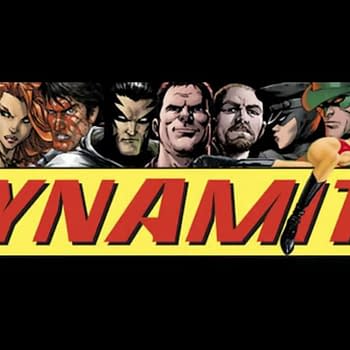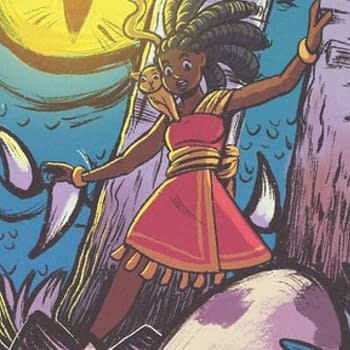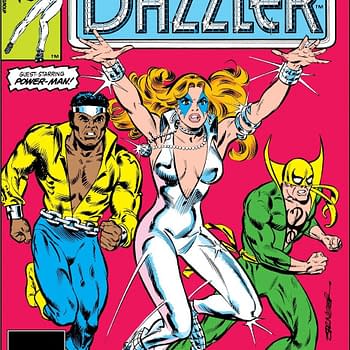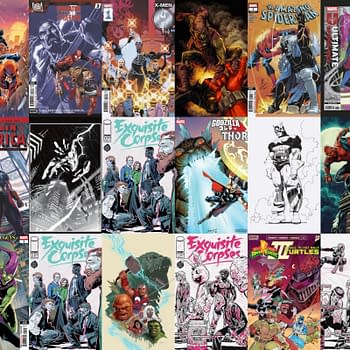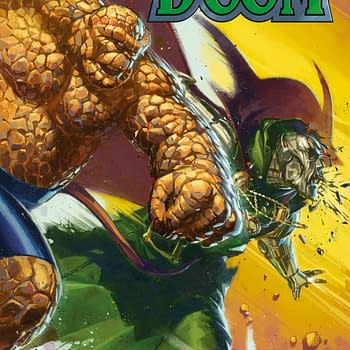Posted in: Comics, Recent Updates | Tagged: Comics, entertainment, image comics, jock, Matthew Hollingsworth, scott snyder, thought bubble, Wytches #2
Who Would You Pledge? Wytches #2 Makes You Wonder How Well You Know Your Family
I've found one use for the comic Wytches that writer Scott Snyder, artist Jock, and colorist Matthew Hollingsworth probably never intended: staving off the shackles of jetlag after a red-eye flight. I find myself in Leeds ahead of the Thought Bubble comic festival, where Snyder and Jock will also be in attendance, and even a glimpse of Wytches #2 from Image Comics left me staring out my train window at an autumn landscape where suddenly every quaint farmstead and copse of withering trees and brush suddenly became potentially full of eyes and gaping mouths. Or worse, a place of strange visions and reimagined memories since Wytches #2 suggests a net is tightening around the Rooks family, if not their entire town when it comes to the elemental, so far from human creatures known as the Wytches.
The letter page for this issue reads, "Who would you pledge?", and that is the question that haunts this installment of the story as we begin to suspect that characters we thought knew nothing of these strange creatures and the violent snatchings associated with them might know a hell of a lot more than we thought. It's a testament to Snyder and Jock's work that these early revelations, even in their subtle stage shock us as if we've just learned something about someone close to us and the secrets they keep.
But before I go further let me mention that the structure of Issue #2 increases the tendency of Issue #1, which initially was probably kept simpler to a point to establish the world for us new readers, and that tendency is to use juxtaposition of resonant images and moments from different points in time and perspective to create tension and hint at meaning. For instance, and Snyder referred to this in a Bleeding Cool interview at the advent of Wytches, Papa Rooks is presented doing an everyday task he's been putting off, setting up an electric chair lift for his wife. But that's set in contrast to what's really on his mind—in quite a psychologically telling way, he's working on a children's book where wishes come true with disastrous consequences and a lesson to be learned. Did one of his wishes come true and result in disaster? Did he "pledge" someone to the Wytches perhaps? That's not a certain thing at all, but Snyder could be hinting that someone in the Rooks family did, which has created these struggles they currently face. In his daily task he feels thwarted and ineffectual, just as he is increasingly powerless against what's happening to Sailor.
But that's only scratching the surface of this issue where hints and directing features seem hidden behind every tree. I don't know how much of a shock it will be to other readers, but it is a shock to me how aggressively Sailor attempts to unlock what's happening in her life and how overtly crazy her behavior becomes. It sounds, of course, insane that she thinks she's seen predatory creatures outside her window, but is it insane in the face of a neck injury and strange growth she receives? She's acting so decisively in Issue #2, and yet doesn't even fully understand yet what's going on with all this "pledging" stuff it seems, but those who do know about it, or may, are the ones who fail to act, perhaps out of self interest or personal gain.
Actually, it becomes increasingly important that you read that BC interview referred to above if you're a big fan of Wytches to understand some of what's coming and to hear Snyder's thoughts regarding this "pledging" stuff. It seems that someone can make a deal with the Wytches to give them someone to eat in exchange for a wish of wide-ranging possibilities based on occult and natural science. The motives behind making "pledges" will plumb the depths of human character in this story and show the understandable temptations even a relatively "good" person might face given this chance. To get back to Sailor for a moment, what exactly is her role in all this "pledging"? That's unclear at this point. My guesses are purely speculative: that she was saved by someone pledging someone else in return in the past, that she accidentally pledged the rather psychotic bully Annie whose death haunts her (this would make sense in terms of her guilt if she understands on some level what she did), or that she has some inherent connection to the Wytches that makes her a natural source of "pledges" (which would explain the scary plaid-wearing backwoods shaman guy who seems to pursue her).
This whole question of "Who would you pledge?" is clearly heating up and becoming central to the story as Sailor's mother Lucy is also confronted with a young boy in a hospital who seems to know what this phenomenon is about too. But I also want to mention what exactly it is that binds this multi-faceted narrative together as it jumps around in time, setting, and perspective. Papa Rooks is the one who gives us the most direct statement on this. He says that having kids and sending them out into the world is like having a "vital organ" wandering around exposed to danger all the time. And he says this while he works on a chair for his wife and talks about a story he's made for children. The network so far in Wytches is a heavily psychological and emotional one, and it's the family unit.
When one family member is in danger, the rest are threatened beyond measure, and if one brings a darker element into the family, as Sailor and potentially Lucy, too, has done, the others feel it and are not immune. We begin to get the sense in Wytches #2 that if this family cannot stick together, and address these dangers as a united front, they really will become the subjects of a tragedy. Sailor is increasingly isolated in her obsessions, and isolation is become a major threat in the story. Maybe that's part of the affects of the Wytches, in the end, that people seem to make decisions alone that become an isolating factor in their lives, too.
Wytches #2 begins to pose big questions to the reader through the characters, but it also comes into its own visually as a horror comic in many ways, one posed in a very psychological way. As we begin to encounter the chaos in the minds of the characters, we get a more frenetic layout and more emotionally-laden panels and scenes. It becomes clear what I have suspected about Wytches from an early date: that the horror in the comic is real, even as it defies tropes, but it's posed as an exact counterbalance to the horrifying realities of psychological states as well, which makes it as much a drama as a horror story.
For folks lucky enough to be at Thought Bubble this weekend, you might want to nose around—something Wytches may just find you to celebrate Snyder and Jock's presence at the festival and the issue's release. Image are also staging a rather large presence at the festival, so that might be a place to start if you are Wytches-curious. Thought Bubble tweeted awhile back:
A preview of @JeffLemire's Thought Bubble variant for @ImageComics' Wytches #2, available at #TBF14's convention! pic.twitter.com/v9vbUBaDa4
— Thought Bubble (@ThoughtBubbleUK) October 31, 2014













